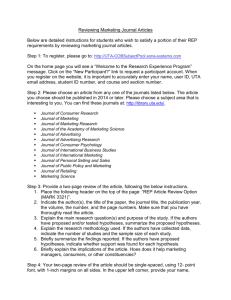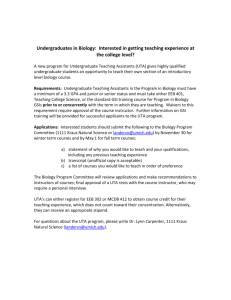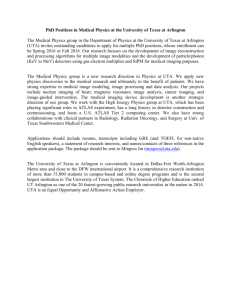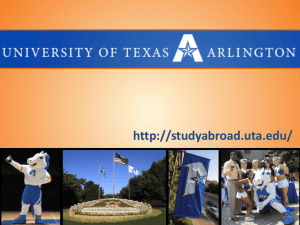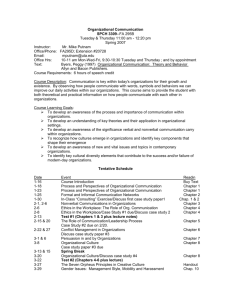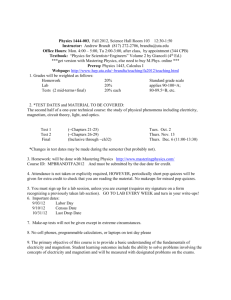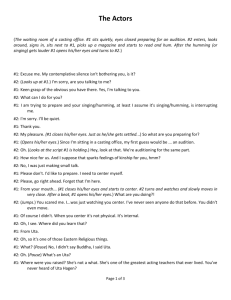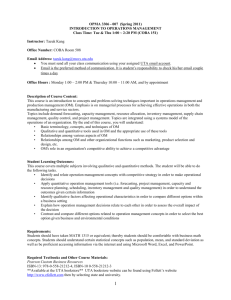2014_no10077_Lilly_presentation
advertisement
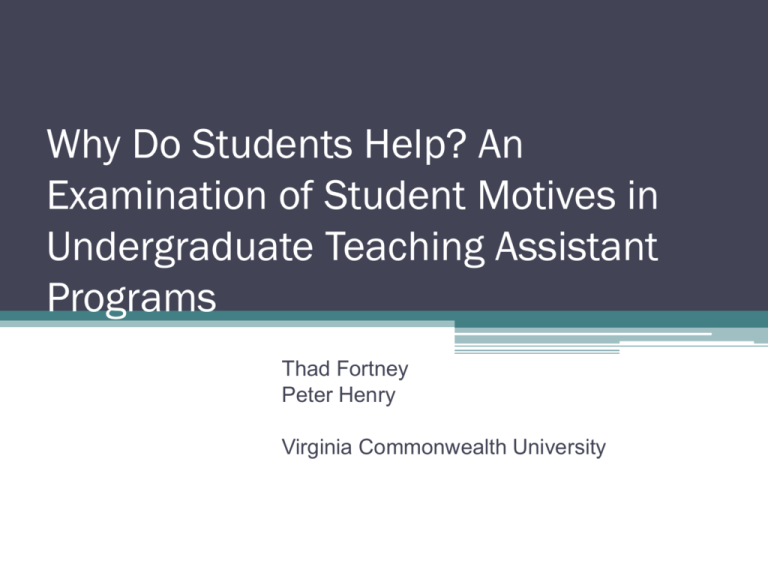
Why Do Students Help? An Examination of Student Motives in Undergraduate Teaching Assistant Programs Thad Fortney Peter Henry Virginia Commonwealth University What do you need to know to understand this talk? I. Virginia Commonwealth University II. Department of Focused Inquiry @ VCU III. Undergraduate Teaching Assistant program in the Department of Focused Inquiry IV. Study of UTA Motivations V. Results VI. So What? I. Virginia Commonwealth University • Founded in 1968 (same moment as other Virginia universities were expanding to serve regional populations) • Urban research institution in Richmond’s central core • Approximately 31, 500 students (24,000 undergraduate) • Historically a regional university; in recent years has shifted to serving students from across the state and the world II. Department of Focused Inquiry @ Virginia Commonwealth University • Founded in 2007 to address three challenges: ▫ Skills gap between high-stakes testing and college success ▫ Success beyond college (Alumni and Board initiative) ▫ Increase student retention (78-87%) II. What is Focused Inquiry? • Three-semester sequence • Roughly 60 full-time faculty on multi-year contracts (non-tenure track) III. Undergraduate Teaching Assistant Program in Focused Inquiry • Proposed by students • Pilot program in AY 2008-9 ▫ Six students, 1 professor • Current Participation AY 2014-15: ▫ 150 students, 25 professors ▫ 2 co-coordinators divided between first year and second year courses ▫ Yearlong “Honors” program for students who have served beyond one year III. UTA Program Structure Note: This image can be found in the article uploaded to our presentation. III. UTA Program in Focused Inquiry Structure Requirements • Students are directly solicited by faculty • Goals ▫ Model student behaviors ▫ Increase student engagement ▫ Develop leadership • Not discipline-specific • Differences from traditional UTA programs ▫ Credit, not money ▫ Students are not gofers • Attendance at all class sessions • “Meaningful contribution” 3x/semester • Weekly hour-long staff meetings • Written reflective product • Monthly student led practicums IV. Our study of student motivations • Resulted from failed practicums UTA Assessment Survey Fall 2012 1. My purpose as a UTA is clear. 2. As a UTA, I consider myself a leader in the classroom. 3. Being a UTA has improved my oral communication skills. 4. Being a UTA has improved my time management skills. 5. The skills I use as a UTA are relevant and helpful to my other coursework. 6. Since being in the UTA program, my collaborative skills have improved. 7. As a UTA, I feel I am an asset to students. 8. As a UTA, I feel I am an asset to my faculty mentor. 9. The UTA practicums are a helpful part of the UTA program. 10. My work as a UTA has reinforced my learning from Focused Inquiry and/or UNIV 200. 11. How has your view on education changed since being in the UTA program? 12. Would you recommend this program to a fellow student? What would you change about the program in order to improve their experience? IV. Practicums get bashed in the Qualitative Results (Question 12) •“I would get rid of the practicums, or make them more useful. I would also try to make the TA more useful in the classroom.” •“I think the practicums are a waste of time. I know what I signed up to do in the classroom, and quite frankly that's all I planned on doing. However, this one minor annoyance is not enough to keep me from recommending this others.” •“Yes - it is a strong program that made an initially inaccessible act (being a TA) very possible for me. The only thing I would change is that I do not understand the purpose of the practicum my meetings with my faculty mentor more than suffice for focusing my actions in the classroom to be an ideal UTA.” IV. Students get a greater appreciation of teaching and learning (Question 11) • “I respect the teachers for the work they have to do more now than I did before.” • “I feel that, since becoming a UTA, I have a clearer perspective on the relationships between students and their professors. As a student, I may fail to see the motivation behind a professor's actions, and a professor may not be able to identify with the struggles a student may face, but as a UTA, I have become more familiar with the challenges and restrictions faculty face and more understanding of the dynamic in the classroom.” • “The program has opened my eyes to not only the amount of planning needed for a class, but also flexibility. A strict lecture style is not the best environment for education, but rather a classroom with discussions, workshops, small lectures and various other teaching styles.” IV. Quantitative Results are initially unsurprising IV. Until we see this! So what? Questions?
